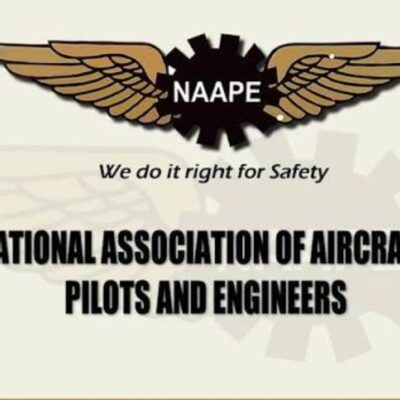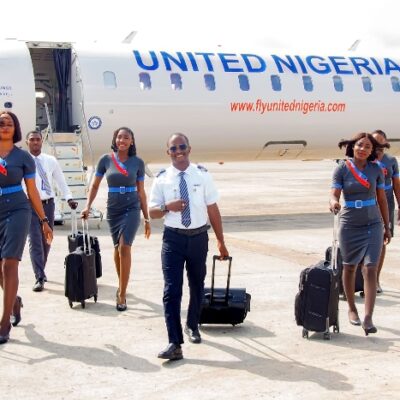Flight Dispatchers Association of Nigeria (FLIDAN) is requesting that Flight Dispatchers’ type-ratings be stamped on their licenses to enhance accountability and safety, that mandatory logbooks for dispatchers, akin to those used by pilots, to document and preserve critical experience gained on the job be introduced and that “there must be policies ensuring consistent job placements and on-the-job training opportunities for new graduates.”
This call was made by President of FLIDAN, Mr. Daniel Ayuba in his welcome address at the FLIDAN Annual Conference held in Lagos with the theme, Flight Dispatchers-The Ground Crew Behind Safe And Successful Flights.
Ayuba said further that “airlines must foster transparency and fairness in salary structures, empowering Flight Dispatchers with the respect and compensation they deserve” reminding the audience that “less than two months ago, we lost a dedicated Flight Dispatcher who collapsed and died on the tarmac, an avoidable tragedy that highlights the cost of neglect. Others remain hospitalized due to overwork and poor conditions. How many more must suffer before change is effected.”
He stated that “Flight Dispatchers are the unseen pilots, commanding operations from the ground to ensure safety in the skies. Yet, we are overworked, undervalued, and underpaid. This cannot continue. We must foster a culture that values and protects the professionals who underpin the safety of every passenger flight.
Together, let us advocate for change, align with international standards, and ensure that Flight Dispatchers receive the recognition, respect, and resources they deserve.”
Ayuba said “in an industry where safety is paramount, the pivotal role of Flight Dispatchers often goes unnoticed, yet we stand at the very heart of aviation safety and efficiency.
To understand our significance, let us reflect on the rigorous groundwork that ensures a safe flight. From pre-flight planning assessing airworthiness, ensuring that an aircraft is fit to fly, to crew management, weight and balance checks, airport evaluations, and, of course, weather analysis, every task demands precision.
Weather, for instance, is like a signpost in the sky. Despite not stepping outside to observe it, dispatchers rely on advanced systems to predict and prepare for an 18-hour journey with unerring accuracy.
Fuel management, what I term “life in the tanks”—requires detailed calculations to account for every phase of flight. These elements illustrate just how critical our work is. Dispatchers ensure that flights are ready to depart with optimal safety even before the flight crew arrives.”
Highlighting dispatchers challenges, he said: “Despite the indispensable nature of our work, there remain glaring safety and employment issues.
Under NCAR 8.4.1.16, pilots are restricted to operating two types of aircraft to ensure safety. However, Flight Dispatchers, shockingly, can be tasked with dispatching multiple aircraft types not stamped on their licenses.
This glaring inconsistency undermines safety, as familiarity with specific aircraft types is essential for both pilots and dispatchers alike. We implore regulatory bodies to rectify this disparity by reinstating type-ratings on dispatchers’ licenses.
Furthermore, of the approximately 1,500 licensed Flight Dispatchers in Nigeria, fewer than 500 are employed. Alarmingly, many licenses have lapsed due to lack of opportunities within five years of issuance, rendering these individuals ineligible to work.
Those fortunate enough to find employment face exploitative conditions.”
On salary dynamics between Flight Dispatchers and Pilots, Ayuba said “while both roles demand high-level expertise and share significant safety responsibilities, the disparity in remuneration is staggering.
Pilots, justifiably, earn substantial pay that reflects their role’s importance. Additionally, pilots often share salary information openly among themselves, which strengthens their bargaining power.
They approach negotiations with unified expectations, knowing that their colleagues will not settle for less. In stark contrast, Flight Dispatchers are subjected to manipulation.
Airlines deliberately discourage transparency, urging individual dispatchers to conceal their salaries from one another.
This practice not only fosters disunity among dispatchers but also weakens their collective bargaining power. It is an exploitative tactic that must be condemned.
We, too, deserve salaries that reflect our extensive training and critical responsibilities.”
On fatigue as a safety threat, he said “Internationally, aviation authorities recognize fatigue as a critical safety concern.
The Nigerian Civil Aviation Regulations (NCAR 2023) Part 8.10 explicitly limits Flight Dispatchers to a maximum of 10 hours of duty.
Yet, this provision is regularly flouted, particularly in outstations, where dispatchers often exceed these limits without consequence.
Fatigue compromises decision-making and jeopardizes lives—an issue we must address urgently.”
In his presentation titled Improving Work Conditions for Flight Dispatchers: A Comprehensive Approach, The 2nd Vice President of Aviation Safety Round Table Initiative (ASRTI), Dr. Alex Nwuba agreed with Ayuba. He said “Flight dispatching is a demanding task that requires meticulous attention to detail, sound decision-making, and the ability to handle high-pressure situations.
Despite their vital role, flight dispatchers often face challenging work conditions that can impact their job performance, mental health, and overall well-being.”
He identified key Issues Affecting Flight Dispatchers as “Long and Irregular Work Hours, High-Pressure Environment, Limited Work-Life Balance, Lack of Recognition and Appreciation, Underestimated Role and Limited Career Advancement Opportunities” suggesting strategies to improve work conditions as Optimized Shift Scheduling, Effective Stress Management Techniques, Enhanced Work-Life Balance, and Career Development Opportunities” calling for collaboration, industry-wide standards, regular performance evaluations and feedback.”
In his remarks, Nigeria’s former Ambassador, Ambassador Ayoola Olukanni equally highlighted challenges facing flight dispatchers as being overworked, low remuneration with an average pay of N200,000 per Month, poor medicals and high unemployment among qualified dispatchers.
He said “there is need for commensurate remuneration for flight dispatchers. They need to be type rated like pilots and cabin crew with appropriate remuneration.
Airlines and airports should recognize the critical role of flight dispatchers and provide them with the necessary resources and support.
Regulatory bodies should urgently establish standardized training and development programmes for flight dispatchers.
There should be promotion by the aviation industry of collaboration and knowledge-sharing among flight dispatchers, airlines, airports, and regulatory bodies, support by governments and international organizations to career development of Flight Dispatchers.
In line with the global quest to combat negative impact of climate change, more attention should be paid to development of sustainable aviation fuels and reduction of the environmental impact of air transportation.”
He also proposed a five year capacity development road map for flight dispatchers, saying: “A committee should be set up to draft such a road map using relevant Documents in the Aviation Sector.
The DRAFT should be SUBMITTED for discussion at an Extraordinary Meeting of the Association at the end of June 2025 and sent to the Honourable Minister of Aviation and other stake holders in the Aviation sector for further necessary action.”
Mr. David Olatunji in his presentation on required change in the operation control centre for safety cited ICAO Doc 10106- Manual on flight operations officer/flight dispatchers’ competency-based training and assessment (CBTA) as saying that
“All personnel involved in the system of operational control must be competent and qualified to ensure flight safety at a basic level, independent from the advanced operator and role specific qualification programme” and that “Unless the advanced operator and role-specific qualification is achieved, the initial FOO training alone does not qualify for responsibilities in operational control duties.”
Olapeju is a journalist and aviation reporter.





